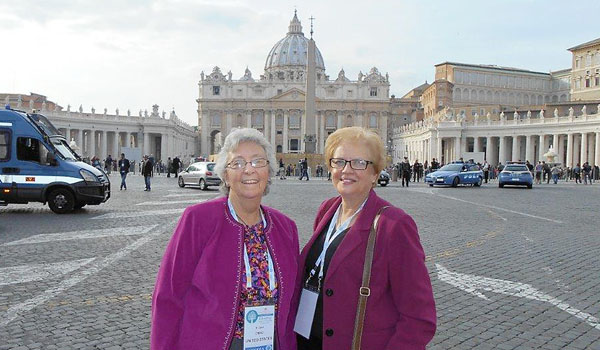Diocesan school leaders attend World Congress on Catholic Education

On the occasion of the 50th anniversary of the Vatican II education document "Gravissimum Educationis," the Vatican's Congregation for Catholic Education convened a World Congress in Rome from Nov. 17-21. Carol Kostyniak, secretary for Catholic Education, and Sister Carol Cimino, SSJ, superintendent of Catholic schools, were among 80 invited to represent the Catholic schools of the United States.
The purpose of the Congress was to address, along with more than 1,000 delegates from over the world, the "educational emergency" in Catholic education, and to re-energize people involved in Catholic schools, to carry out this vital mission of the Church.
The Congress, assembled in the Vatican and in Castel Gondolfo, posed a five-point agenda: Dialogue and debate on challenges to Catholic education; analysis of the challenges; examination of ideas that education is proposing and developing about society and humanity; formulation of useful solutions; and drafting of a message that is meaningful, descriptive, and challenging.
The Holy Father was in attendance on the last day and responded to questions and remarks about Catholic education. Pope Francis reminded everyone that Catholic schools "should not become elitist" offering education to only those who can afford it. He challenged those attending to reach out to the poor and marginalized.
The structure of the Congress called for the examination of the "Instrumentum Laboris" that was used in the planning for the meeting. The document calls for improved Catholic identity and teacher formation and witness to the Catholic faith. Educators from varied countries and cultures gave observations and opinions on the areas of concern.
"What we heard is that most other countries support Catholic schools with public monies, but that the issue of the Catholic identity of the schools was paramount, given the cultural contexts from which the students come," said Sister Carol.
"Factors such as poverty, cultural inequality, and the struggle to better one's life were explored, but the attendees were urged to resist promoting Catholic education as a step up to higher earnings," Kostyniak said. "Rather, they were asked to emphasize the fact that Catholic education should be places where students learn service."
Kostyniak also stressed that Pope Francis cited how educators must be risk-takers because if they are not, they will be closed in by the walls of their fears.
"We are so grateful that Bishop (Richard J.) Malone encouraged our attendance," Kostyniak said. "Seeing the Holy Father, just being at the Vatican, and encountering Catholic educators from all over the world was a once-in-a-lifetime experience."
Both Kostyniak and Sister Carol are eager to share their experience with the various advisory groups with whom they work.




